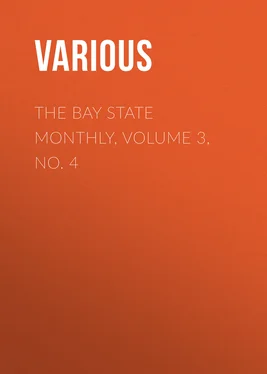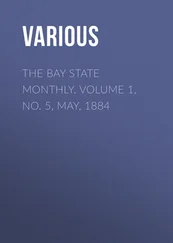Various - The Bay State Monthly, Volume 3, No. 4
Здесь есть возможность читать онлайн «Various - The Bay State Monthly, Volume 3, No. 4» — ознакомительный отрывок электронной книги совершенно бесплатно, а после прочтения отрывка купить полную версию. В некоторых случаях можно слушать аудио, скачать через торрент в формате fb2 и присутствует краткое содержание. Жанр: foreign_antique, periodic, foreign_edu, на английском языке. Описание произведения, (предисловие) а так же отзывы посетителей доступны на портале библиотеки ЛибКат.
- Название:The Bay State Monthly, Volume 3, No. 4
- Автор:
- Жанр:
- Год:неизвестен
- ISBN:нет данных
- Рейтинг книги:5 / 5. Голосов: 1
-
Избранное:Добавить в избранное
- Отзывы:
-
Ваша оценка:
- 100
- 1
- 2
- 3
- 4
- 5
The Bay State Monthly, Volume 3, No. 4: краткое содержание, описание и аннотация
Предлагаем к чтению аннотацию, описание, краткое содержание или предисловие (зависит от того, что написал сам автор книги «The Bay State Monthly, Volume 3, No. 4»). Если вы не нашли необходимую информацию о книге — напишите в комментариях, мы постараемся отыскать её.
The Bay State Monthly, Volume 3, No. 4 — читать онлайн ознакомительный отрывок
Ниже представлен текст книги, разбитый по страницам. Система сохранения места последней прочитанной страницы, позволяет с удобством читать онлайн бесплатно книгу «The Bay State Monthly, Volume 3, No. 4», без необходимости каждый раз заново искать на чём Вы остановились. Поставьте закладку, и сможете в любой момент перейти на страницу, на которой закончили чтение.
Интервал:
Закладка:
At last General Scott began to wonder why he had received no further tidings from Major Anderson, and on the 27th of December he delivered the following message to the President:—
Since the formal order, unaccompanied by special instructions, assigning Major Anderson to the command of Fort Moultrie, no order, intimation, suggestion, or communication for his government and guidance, has gone to that officer, or any of his subordinates, from the head-quarters of the army; nor have any reports or communications been addressed to the General-in-chief from Fort Moultrie later than a letter written by Major Anderson, almost immediately after his arrival in Charleston harbor, reporting the then state of the work.
This letter reached the President on the 27th. On the day before Major Anderson had transferred his entire garrison from Fort Moultrie to Fort Sumter. It was a bold move, done without orders, and solely because there was no longer hope that the President would send reinforcements. It was a judicious move, because Sumter was the real key to Charleston harbor. It was an act of patriotism which will forever enshrine the name of Anderson in American history.
The tidings reached Washington. Disappointed and chagrined, Secretary Floyd sent the following telegram:—
WAR DEPARTMENT. ADJUTANT-GENERAL'S OFFICE, December 27, 1880.MAJOR ANDERSON, Fort Moultrie: —
Intelligence has reached here this morning that you have abandoned Fort Moultrie, spiked your guns, burned the carriages, and gone to Fort Sumter. It is not believed, because there is no order for any such movement. Explain the meaning of this report.
J.B. FLOYD,
Secretary of War .
The answer was as follows:—
CHARLESTON, December 27, 1860.HON. J.B. FLOYD, Secretary of War: —
The telegram is correct. I abandoned Fort Moultrie because I was certain that, if attacked, my men must have been sacrificed, and the command of the harbor lost. I spiked the guns, and destroyed the carriages, to keep the guns from being used against us.
If attacked, the garrison would never have surrendered without a fight.
ROBERT ANDERSON, Major First Artillery.The event reached the President's ears; he was perplexed, and postponed the promised interview with the Commissioners one day. He met them on the 28th. He states, in his Defence , published in 1866, that he informed them at once that he "could recognize them only as private gentlemen, and not as commissioners from a sovereign State; that it was to Congress, and to Congress alone, they must appeal." Nevertheless, he expressed his willingness to communicate to that body, as the only competent tribunal, any proposition they might have to offer; as if he did not realize that this proposal was a quasi-recognition of South Carolina's claim to independence, and a misdemeanor meriting impeachment.
The Commissioners, strange to say, were either too stupid or too timid to perceive the advantage of this concession. Fortunately for the country, their indifference lost to Rebellion its only possible chance of peaceful success.
The Commissioners evidently believed that the President was within the control of the cabinet cabal, for they made an angry complaint against Anderson, and imperiously demanded "explanations." For two days the President wavered. An outside complication tended to open his eyes. On the 31st of December Floyd resigned the portfolio of war; and, on the same day, the President sent to the Commissioners a definite answer that, "whatever might have been his first inclination, the Governor of South Carolina had, since Anderson's movement, forcibly seized Fort Moultrie, Castle Pinckney, and the Charleston arsenal, custom-house, and post-office, and covered them with the palmetto flag; that under such circumstances he could not, and would not, withdraw the Federal troops from Sumter." The angry Commissioners returned home, leaving behind them an insolent rejoinder, charging the President "with tacit consent to the scheme of peaceable secession!"
The crisis of December 31st changed the attitude of the Government toward Rebellion. Joseph Holt, of Kentucky, was appointed Secretary of War. General Scott was placed in military control.
An effort was at once made to reinforce Sumter. On the 5th of January notice was sent by Assistant Adjutant-General Thomas, from New York, to Major Anderson that a swift steamship, "Star of the West," loaded with two hundred and fifty recruits and all needed supplies, had sailed, that same day, for his relief. Major Anderson failed to receive the notice. On the morning of the 9th the steamer steamed up the channel in the direction of Sumter, when presently she was fired upon vigorously by the secessionists. Her captain ran up the stars and stripes, but quickly lost heart as he caught sight of the ready guns of Fort Moultrie, then put about, and back to sea.
The commander at Sumter was enraged. He sat down and wrote a brief note to the Governor of South Carolina, demanding to know "if the firing on the vessel and the flag had been by his orders, and declaring, unless the act were disclaimed, he would close the harbor with the guns of Sumter." The Governor's reply was both an avowal and a justification of the act. Anderson, in a second note, stated that he would ask his government for instructions, and requested "safe conduct for a bearer of despatches." The Governor, in reply, sent a formal demand for the surrender of the fort. Anderson responded to this, that he could not comply; but that, if the government saw fit "to refer this matter to Washington," he would depute an officer to accompany the messenger.
This meant a truce, which the conspirators heartily welcomed. On the 12th of January, therefore, Attorney-General I.W. Hayne, of South Carolina, proceeded to Washington as an envoy to carry to President Buchanan the Governor's demand for the surrender of Fort Sumter. The matter was prolonged; but, on the 6th of February, Mr. Hayne found that his mission was a failure.
On the 4th of February, while the Peace Conference, so called, met in Washington to consider propositions of compromise and concession, the delegates of the seceding States assembled in Montgomery, Alabama, to organize their conspiracy into an avowed and opened rebellion. On the 9th Jefferson Davis, of Mississippi, was elected President, and Alexander H. Stephens, of Georgia, Vice-President of the new Confederacy. On the 18th Davis was inaugurated.
On the 1st of March General Beauregard was, by the rebel government, placed in command of the defence of Charleston harbor, with orders to complete preparations for the capture of Fort Sumter. The Governor had been exceedingly anxious that the capture should be attempted before the 4th of March. "Mr. Buchanan cannot resist," he wrote to Davis, "because he has not the power. Mr. Lincoln may not attack, because the cause of quarrel will have been, or may be considered by him, as past."
President Lincoln was inaugurated on the 4th of March, 1861. With an unanswerable argument against disunion, and an earnest appeal to reason and lawful remedy, he closed his inaugural address with the following impressive declaration of peace and good-will:—
In your hands, my dissatisfied fellow-countrymen, and not in mine, is the momentous issue of civil war.
The government will not assail you. You can have no conflict without being yourselves the aggressors; you can have no oath registered in heaven to destroy the government, while I shall have the most solemn one,—to preserve, protect, and defend it.
I am loath to close. We are not enemies, but friends. We must not be enemies. Though passion may have strained, it must not break, our bond of affection.
The mystic chords of memory, stretching from every battle-field and patriot grave, to every living heart and hearth-stone all over this broad land, will yet swell the Chorus of the Union when again touched, as surely they will be, by the better angels of our nature.
Читать дальшеИнтервал:
Закладка:
Похожие книги на «The Bay State Monthly, Volume 3, No. 4»
Представляем Вашему вниманию похожие книги на «The Bay State Monthly, Volume 3, No. 4» списком для выбора. Мы отобрали схожую по названию и смыслу литературу в надежде предоставить читателям больше вариантов отыскать новые, интересные, ещё непрочитанные произведения.
Обсуждение, отзывы о книге «The Bay State Monthly, Volume 3, No. 4» и просто собственные мнения читателей. Оставьте ваши комментарии, напишите, что Вы думаете о произведении, его смысле или главных героях. Укажите что конкретно понравилось, а что нет, и почему Вы так считаете.












